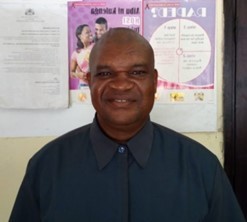Message from COD

Dr. JOHNSON SHUME MANYIWA
DEPARTMENT OF ENVIRONMENT AND HEALTH SCIENCES
Welcome to the Department of Environment and Health Sciences. This is a multidisciplinary department comprising of five sections. These are: Public Health, Community Health, Nutrition and Dietetics, Environmental Science, Marine and Fisheries Sciences. The overall objective of this department is to contribute to the achievement of global excellence in science and technology in line with Technical University of Mombasa (TUM) strategic plan and the Kenya Vision 2030.
DR. JOHNSTONE SHUME
The specific objectives is three-fold: 1) to promote competitive and skilled manpower in public and community health sciences, environmental science, and marine and fisheries sciences; 2) to enhance research work and collaboration, and 3) to promote effective community outreach in public and community health, environmental sustainability, and sustainable utilization of marine and fisheries resources. The Department offers certificate, diploma, undergraduate, and post-graduate programs. These academic programs in the Department are offered both in full time and part time basis. Currently the following accredited programs are on offer:
1. Certificate in Community Health and HIV Management
2. Diploma in Community Health and HIV Management
3. Diploma in Public Health
4. Diploma in Community Health
5. Diploma in Environmental Science
6. Degree in Public Health
7. Degree in Community Health
8. Degree in Marine Resource Management
9. Degree in Fisheries and Oceanography
10. Masters in Public Health
11. Masters in Fisheries and Aquaculture
12. Doctorate in Philosophy in Public Health
The Department is also accredited by the National Environment Management Authority (NEMA) to offer professional short course on Environmental Impact Assessment (EIA) and Audit. Graduates of this short course are licensed by NEMA as Associate EIA and Audit Experts. The Department is also in the process of developing craft courses to promote and build capacity in the Blue Economy sector. Currently, the Department has a total of 12 permanent academic staff and 1 technologist, as well as a total 5 adjunct academic staff members under the Public Health section.
